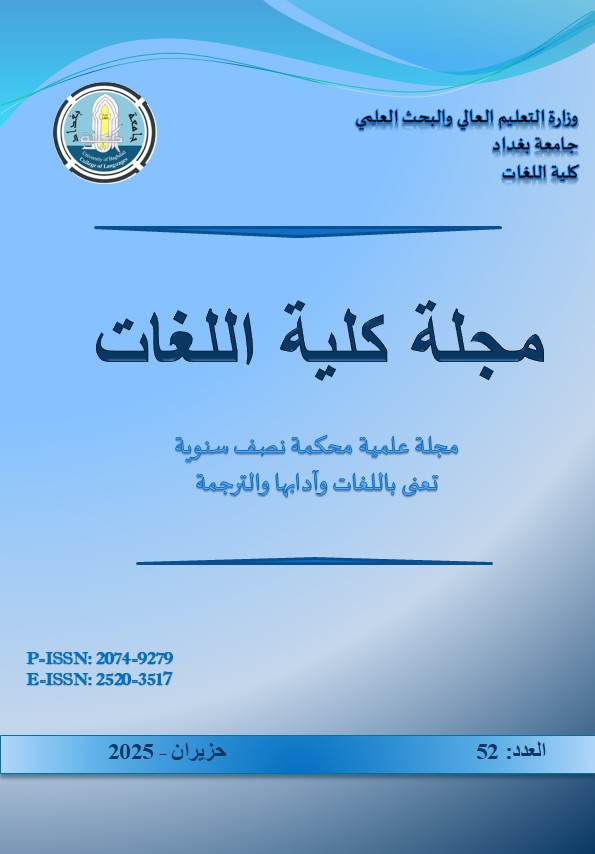دراسة أسلوبية لمفهوم الحب في كتاب النبي لجبران خليل جبران
DOI:
https://doi.org/10.36586/jcl.2.2025.0.52.0001الكلمات المفتاحية:
جبران، النبي، الحب الشامل، الاسلوبية، الفئات المعجمية، الاساليب المجازيةالملخص
في رائعته "النبي"، يستعرض جبران خليل جبران إيمانه الراسخ واعتقاده العميق في قوة الحب الشامل الشافي الي يرتقي بالبشر إلى أفكار سامية ويسمو بأرواحهم وسلوكهم. تهدف الدراسة الحالية إلى اكتشاف الوسائل الأسلوبية التي استخدمها لتمثيل مفهوم الحب بناءً على فرضية أن جبران يميل إلى استخدام تأثيرات أسلوبية معينة لنقل معانيه. تتبنى الدراسة إطار التحليل الأسلوبي الخاص بـ "ليتش وشورت" (2007) لتحليل الفئات المعجمية والاساليب المجازية في مقتطفات مختارة من الكتاب. وتكشف النتائج أن جبران يفضل الأسماء الملموسة والأفعال الديناميكية والصفات الحسية على الأسماء المجردة والأفعال الساكنة والصفات النفسية ليعبر عن نظرته الحيوية والواقعية للحب. وأخيراً، يعتمد جبران بشكل أساسي على التشخيص في الاساليب المجازية، مشيرًا إلى الحب كشخص قادر على القيام بأفعال (يناديكم، يجمعكم، إلخ) بالإضافة إلى التشبيه والاستعارة.
المراجع
Acocella, J. (2007). Prophet Motive: The Kahlil Gibran Phenomenon. New York: The New Yorker.
Al-Fakhuri, H. (1986). Al-Jami’a fi Ta’areekh al-Adab al-Arabi: Al-Adab alHadeeth. Beirut: Dar Al-Jeel,
Al-Janabi, M. (2015). A Stylistic Analysis of Two Selected, English and Arabic, War
Poems. Journal of College of Languages.
Al-Khazraji, N. H. F. and Wong, B. E. (2013). Critical Reading to Gibran’s World in The Prophet. Arab World English Journal (AWEJ).
Al-Saidi, A. H. and Khalaf, A. S. (2022). Investigating the aesthetic effect in the Arabic translations of Gibran’s The Prophet. International Journal of Asia Pacific Studies
Amare, A. (2002). Some selected poems in English by Ethiopian poets: a stylistic analysis, Addis Ababa: AAU Libraries
Boushaba, S. (1988). An analytical study of some problems of literary translation: A study of two Arabic translations of K. Gibran’s The Prophet. Unpublished PhD diss., University of Salford, Manchester, England.
Brohi, F., Brohi, A. and Kabooro, N. (2021). An Analysis of Universality in Khalil Gibran’s The Prophet. Linguistics and Literature Review 7(1): 29- 42.
Buck, C. (2010). Kahlil Gibran. In American writers supplement. New York: Charles Scribners and Sons.
Burke, M. (2017). The Routledge handbook of stylistics, Routledge: London.
Carnie, A. (2013). Syntax: A generative introduction. Malden, MA: Blackwell Publishers
Gibran, K. (1923). The Prophet. New York: Knopf.
Hawi, K. (1972). Kahlil Gibran: His Background, Character and Works. Beirut: The Arab Institute for Research and Publishing.
Ibrahim, R. (2018). A Critical Stylistic Analysis of the Ideological Positioning in Some Selected Poems by John Donne. Journal of College of Languages.
Jabr, J. (1958). Gibran: Siratahu, Adabuh, Falsafatuh wa Rasmuh. Beirut: Dar al-Rashid lil-Tiba’ah wa al-Nashir.
Kane, T. S. 2000. The Oxford essential guide to writing. New York: Berkley Books.
Leech, G. and Short, M. (2007). Style in Fiction: A Linguistic Introduction to English Fictional Prose. (2nd ed.). London: Pearson
Mahmood, R. and Jamil, A. (2015). Stylistic Analysis of Holy Thursday by William Blake. International Journal of English Language and Linguistics Research
Marabout, M. O. (2010). Aesthetic effect in Arabic-English literary translation: A sample from Gibran Khalil Gibran. Unpublished MA thesis., Mentouri University of Constantine, Algeria
McArthur, T. (1992). Figurative Language. In: The Oxford Companion to the English Language (ed. T. McArthur) Oxford University Press.
Moleong, J. L. (2001). Metode Penelitian Kuantitatif. Bandung: PT Remaja Rosodakarya
Mugair, S. and Abbas, A. (2016). A Stylistic Analysis of Oscar Wilde’s the Nightingale and the Rose. International J. Soc. Sci. & Education
Najjar, Iskander. (2008). Qamus Gibran Khalil Gibran. Beirut: Dar AlSaqi
Niazi, N. (2013). A Stylistic Analysis of D.H. Lawrence’s ‘Sons and Lovers’. International Journal of Applied Linguistics & English Literature
Nuaimy, M. (2013). Gibran Khalil Gibran: The Prophet (trans.). Studied and analyzed
by Dr Nazik Saba Yard. Beirut: Dar al-Fikr.
Qrei, B. S. M. (2017). Dynamism in translating Khalil Gibran’s ‘The Prophet’. Unpublished MA thesis, Al-Quds University, Palestine.
Shaw, H. (1972). Dictionary of Literary Terms. McGrow-Hill.
Short, M. (1996). Exploring the Language of Poems, Plays and Prose. London: Addison. Wesley Longman Limited
Simpson, P. (2004). Stylistics: A Resource Book for Students. London: Routledge.
Verdonk, p. (2002). Stylistics. Oxford: Oxford University Press.
Wales, K. (2011). A dictionary of stylistics. (3rd ed.). London and New
York: Routledge
Widdowson, H. G. 1975. Stylistics and the teaching of literature. London: Routledge
Young, B. (1945). This Man from Lebanon. United States of America: The Ryerson Press.

التنزيلات
منشور
إصدار
القسم
الرخصة
الحقوق الفكرية (c) 2025 مجلة كلية اللغات

هذا العمل مرخص بموجب Creative Commons Attribution 4.0 International License.







